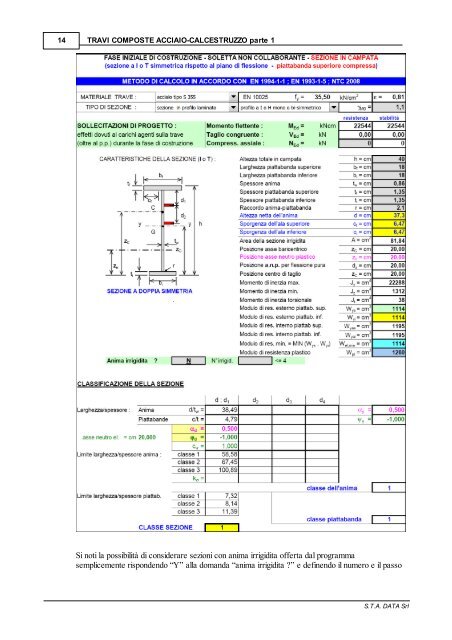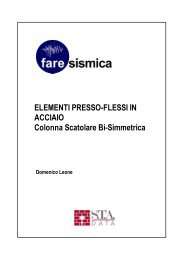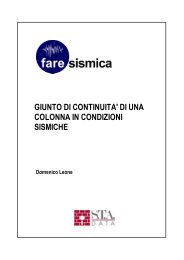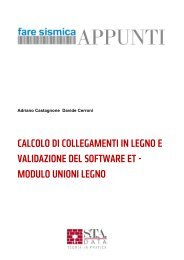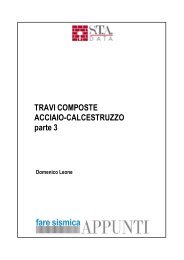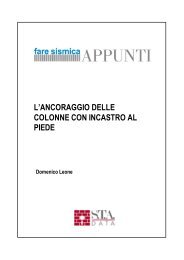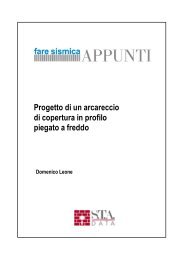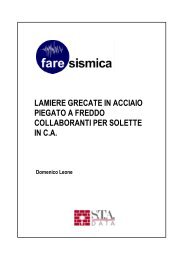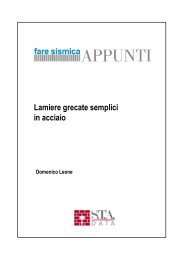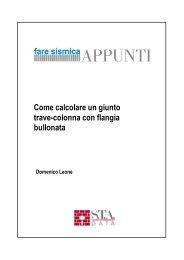TRAVI COMPOSTE ACCIAIO-CALCESTRUZZO ... - S.T.A. Data S.r.l.
TRAVI COMPOSTE ACCIAIO-CALCESTRUZZO ... - S.T.A. Data S.r.l.
TRAVI COMPOSTE ACCIAIO-CALCESTRUZZO ... - S.T.A. Data S.r.l.
- No tags were found...
Create successful ePaper yourself
Turn your PDF publications into a flip-book with our unique Google optimized e-Paper software.
14 JACK MULDER, JR.which insist upon comprehending. Here is the error. We must saythe very opposite, that if human scholarship and science refuse toacknowledge that there is something they cannot understand, or,more accurately, something that they clearly understand that theycannot understand, then everything is confused (JP, 3:3089).The point of this seems to be that Kierkegaard wishes to replyto those who cannot find a motivation for the choice of hell andthus reject its very possibility, that they themselves are unwilling toacknowledge the limits of their own understanding, or at least, thatthey fail to appreciate what he thinks are the disastrous consequencessuch a rejection would have for human freedom.If one thinks that a motivation, sufficient in the abstract for anyone’smaking the same choice must be found for every action, thenhuman freedom essentially does not exist, Anti-Climacus would argue.If each sinful action is due in some part to an agent’s ignorance orsome other defect having to do with her motivational structure, thensome accounting must be given for this earlier defect which causedthis sin. If this does not terminate in some inexplicably deep groundof the agent (because Kierkegaard insists in the rest of the abovejournal entry that the inexplicable must be preserved), then it simplyarises out of an ignorance for which the subject is not blameworthy.If this is the best we can do, then we have a world withoutsin, but also a world without the possibility of despair. Consequently,for Anti-Climacus, we would have a world with infinitely less humandignity. Further, according to Kierkegaard, this would seem to entailan unconditional doctrine of predestination, which, he thinks, makesGod the cause of sin (see JP, 2:1302).Kierkegaard elsewhere has his own nuances to give to the notion offaith, which, Anti-Climacus claims, is the opposite of despair (SUD,p. 49). In JP, he writes, “[f]aith is essentially this – to hold fast topossibility” (JP, 2:1126). Now, do the blessed in heaven hold fast tothe possibility of redemption? Yes and no. They do hold fast to it inthe sense that they will never let it go, for they are finally and permanentlyredeemed. Yet, in another sense, they are not really holdingfast to this possibility at all. This is because they cannot possibly letgo of their blessedness. In one of his rare claims about the afterlife(WL, p. 194), Kierkegaard notes, “[Christianity] will be abolished ineternity, where it will cease to be militant” (Danish: stridende, strivingor fighting). In a curious Kierkegaardian mix, then, the blessed inheaven should have the passion and bliss of faith, but not the struggle.


